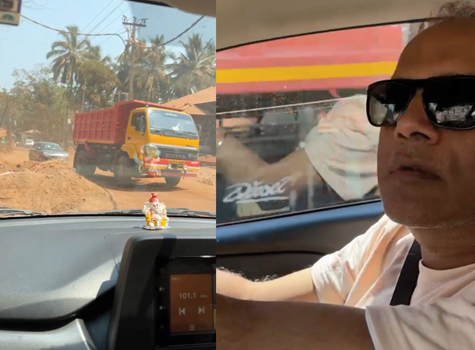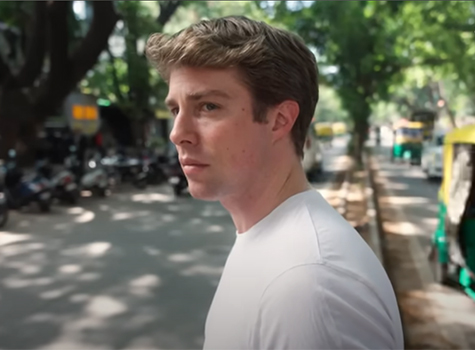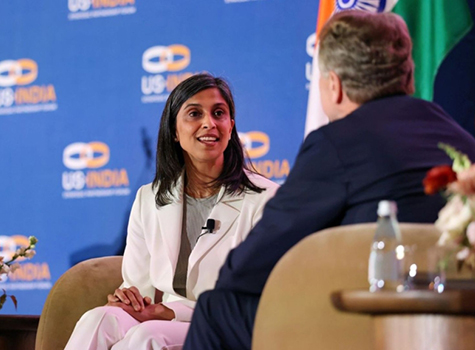
My wife and I visited Goa last month. Last year, we were in South Goa but this year we decided to spend time in North Goa, in a small town called Vagator. One of the lessons we learned from our visit last year is that transportation is a big problem — taxis are hard to come by and there are no Ubers or Olas. They had an equivalent service called GoaMiles but it was unreliable. Most visitors either rent a scooter or rent a car themselves.
I was a bit reluctant to rent a car because I had not driven much in India. I learned to drive in the US, so my mind is tuned to driving the right way! Luckily, I had driven stick-shift cars for about fifteen years so I was confident I could handle gear shifting. I was nervous about making a mistake and facing a bunch of cars driving toward me like an armada. I came up with a plan and decided that I’ll remind myself to stay on the left side of the road after every turn. My wife was a bit skeptical, but I managed to convince her. We decided to rent the car for two weeks from a local guy, Amit.
I decided to go on a practice drive with him. He gave me a few useful tips; the most helpful thing he pointed out was that on most roads there were 1.5 foot wide and 1.5-foot-deep trench on the sides. He told me that if I am not careful, the car would fall in the trench. He also showed me where the horn was – a must. He showed me the button to close the mirrors on both sides and warned me not to close them manually. I told him I would be careful. There was a lot of pressure because Amit entrusted me with the best car in his 20-car fleet, an almost new Suzuki Baleno.
Overcoming the conditioning of right-hand drive was harder than I expected. Before starting the car, I would find myself sitting on the left side of the car (the passenger side) while the passersby would look at me strangely. While driving, I kept mistaking the wiper switch with the indicator light which added to the chaos.
Since we were renting an apartment that was about a 15-minute walk from Vagator beach, we decided to explore alternate accommodations closer to the beach. My wife and I drove around looking at options. We found a decent lodge. The lodge operator gave us a tour of the place. Although it was closer to the beach, the accommodation was not any better than the apartment we already had. We also noticed that the closer we got to the beach, the more run-down the places looked. I told the operator that we would think about it and asked for his card. I looked at the card and noticed that his name was Lazarus. I couldn’t resist asking him, “When did you come back?” He seemed to be impressed that I knew enough about the Bible to ask that question. He replied, “As a matter of fact I almost died twenty years ago but by some twist of fate, I was revived.” I gave him a congratulatory handshake and told him we would get back to him if we were interested. It was a relief to hear his name was Lazarus. If something happened to me driving on the wrong side of the road, maybe I’d come back too.
On the way back from the beach to our apartment, I noticed that there were no road signs. No yield signs, no merge signs, no one-way sign and no stop signs. There were no lane dividers. You knew the road ended on the left side when the trench began. I also did not see any traffic lights. I also suddenly became aware of the large number of cows and dogs on the road. It reminded me of my rides in Old Delhi from my childhood where cows, dogs, and camels were common on the street. Luckily, I never had to bother driving at that time. Here in Goa, it was different. I had to be hyper alert all the time. That meant, no chit-chatting with my wife. There were no relaxing moments where we could enjoy the ride. We had to be constantly vigilant, keeping the analytical left-side of the brain busy.
During the first two days, it was like riding a rollercoaster at an amusement park. Literally. There were large numbers of speedbumps on the road and most of them did not have any markings. I found my car was airborne every few minutes. My wife would be screaming, “Aram se! Be careful! Slow down!!” Then I would point out that the speedbumps had no or worn-out paint so I couldn’t tell when they were coming up. Later we figured out that besides navigation and warning me of pedestrians, scooters, cows and dogs, her job would be to point out any speed bumps ahead of time.
The most terrifying part of the drive was that on narrow roads, a big truck or an SUV would come on the other side. I would slow down and come to a complete stop. My wife would just close her eyes in fear. I would look up to the driver of the other vehicle to give me instructions because I was afraid my car would fall in the trench. “OK, now go a bit left. Now stop. Now move slowly. Straight.” Luckily, the people were friendly, and they could tell I was a new driver. Other drivers following the truck would also give instructions through sign language. It was amusing and scary at the same time!
I learned quickly that the cars followed a hierarchy like the Indian caste system. The big trucks were the Brahmins, the upper caste, followed by the SUV’s, the Kshatriyas, the warriors. I automatically fit in the correct category of the Bania, the merchant, driving a small car. The two-wheelers and the pedestrians were the lower class. I always had to stop and give the right of ways to the Brahmins and the Kshatriyas in their trucks and SUV’s. I learned to go into traffic without fear if there was a swarm of scooters coming in the opposite direction, knowing that they would give me the right of way.
My wife was a big savior using Google Maps on the phone, helping me navigate. But I never got used to her screaming or fearful expressions. I found it more distracting than the cows. When we were leaving Goa, we got a cab to drop us at the airport. The driver was driving a bit fast so my wife, out of her habit, started repeating, “Be careful! Slow! Easy!!” After hearing it a couple of times, he told my wife that he could not drive like this, and he surely would have an accident if she continued that way. I smiled because he accurately summed up my feelings for the last two weeks.
The night when we were scheduled to leave, I was making a left and my wife warned of a dog on the street. I slowed down and honked, hoping it would move. But it didn’t. Maybe he was complacent or confident of my driving skills to avoid him. I honked again and moved slowly. I didn’t hear any howling, so I knew I didn’t hurt the poor animal. I marveled at the fact that the dog was too lazy to get out of the way. But then I thought the dog was confident of my ability to drive properly.
When I was leaving Goa, I was thankful that I was able to move around with my wife and explore nearby places in the car. I was also thankful that I managed to return the car to Amit without running into a ditch and without a single scratch mark. In the end, I was amazed during our two weeks stay, we didn’t see any road accidents or any calamities despite the lack of road signs, warnings against speedbumps, and carefree cows and dogs roaming the streets. That was amazing and it defied all logic. One would think that the system would collapse anytime and would create utter chaos, but it didn’t. And for that Goa has to thank two other G’s for that: Google Maps and the Gods!
Raajeev Aggerwhil is a Los Angeles-based comedian. Follow him on Instagram @raajeevcomedy. To see his videos on YouTube, search for his name.



